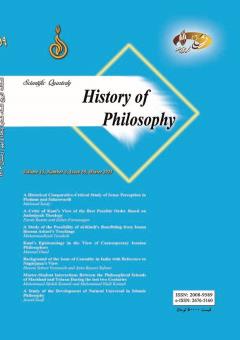A Critic of Kant’s View of the Best Possible Order Based on Imāmīyyah Theology
Subject Areas : Geneology of philosophical schools and Ideas
Farah Ramin
1
![]() ,
Zahra Farzanegan
2
,
Zahra Farzanegan
2
![]()
1 - Professor at the Islamic Philosophy and Kalam Department, Qom University, Qom, Iran
2 - PhD in Islamic Kalam, Qom University, Qom, Iran
Keywords: theory of the best possible world, Kant, problem of evil, Imāmīyyah theology,
Abstract :
The problem of moral evil and the quality of its justification within the framework of the best order is one of the fundamental challenges in philosophy of religion. During the early period of writing as a critic, Kant provided three arguments in defense of the theory of the best possible world, which indicates his transition from theoretical wisdom to practical wisdom. Following a descriptive-analytic approach, this paper initially examines the possibility and rationality of the theory of the best possible world in Emmanuelle Kant’s philosophy, which is based on the principles of practical wisdom. Then it deals with its consistency with the theories of Imāmīyyah mutikallimūn. Generally speaking, based on Shīʻī principles, two theories of “the best possible world” and the “only possible world” can be presented. Here, the authors have focused on the theory of the best possible world as the ultimate theory because of the inconsistency of causal necessity with the Will of God, as the creator of this world. Moreover, Kant’s conceptual reinterpretation of the “the best possible world”, which, based on Imāmīyyah verses and traditions, is consistent with the attribute of divine wisdom and God’s purpose of creating humanity, is propounded as an acceptable theory.
